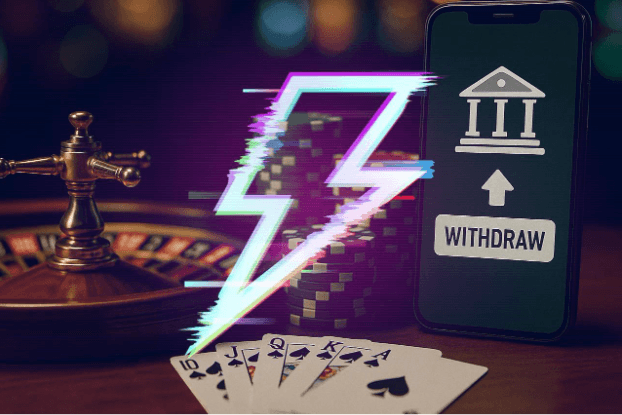For decades, online casinos competed on the obvious. Bigger game libraries. Flashier bonuses. Shinier graphics. But the new battleground isn’t visual. It’s financial.
Players don’t just want to win. They want their money back in their pocket now. The speed of a payout has become the real test of a platform’s tech stack.
Contents
The Contenders: Processing Times by the Numbers
A withdrawal request only moves as fast as the rail it rides. Some rails are relics of the 1970s dressed in modern interfaces. Others are digital-native, built for speed. The spread is brutal, often measured in days versus minutes.
Bank Transfers & Debit Cards
The slow lane. US banks still run on ACH batch cycles. A wire moves through multiple clearinghouses, with every step waiting on business hours. Three to seven business days is the norm. Throw in a weekend or holiday and funds sit frozen until the system wakes up.
E-Wallets (PayPal, Skrill, Neteller)
The middle ground. By cutting out banks as middlemen, these digital wallets slash settlement time to under 24 hours. PayPal tends to be the fastest in the US because of its deep integrations with domestic banks. Skrill and Neteller, meanwhile, remain staples in Europe.
Crypto (BTC, ETH, USDT, LTC, SOL)
A different dimension. Peer-to-peer transfers mean no clearinghouse, no overnight delay, and no banking hours. Once the casino signs off internally, the blockchain takes over. On Litecoin, you could see funds in under 10 minutes. Even Bitcoin, with its slower block times, usually clears within the hour.
The same casino that drags a bank wire through a five-day slog can drop Litecoin into your wallet before you’ve even closed the browser tab. That’s the spread US players face when chasing fast withdrawal casinos in the US. Crypto pushes the spectrum to its edge. When you add in the casinos’ own processing windows, which can range from instant release to a 24-hour review, you get a layered system where every second saved is the result of design, not chance.
The Undisputed Leader: Why Crypto Owns the Speed Game
Crypto isn’t faster because it’s trendy. It’s faster because its architecture sidesteps the very bottlenecks that slow everything else down. Traditional methods depend on old networks like SWIFT, ACH, and SEPA, which all have checks and time windows that must be followed. Even e-wallets, for all their efficiency, still plug into banks at the edges.
Blockchains don’t. They replace clearinghouses with decentralized verification. Instead of waiting for three institutions to talk to each other, your transaction is confirmed by the network itself. No one asks for office hours or cut-off times.
For example, Solana transactions are now confirming in about 2 seconds once network congestion is under control. Meanwhile, confirmation speeds for Litecoin are in the 5-10 minute range, and Ethereum’s range can stretch from seconds to several minutes depending on congestion.
For the player, this means the only real wait is the blockchain’s confirmation cycle. And on modern networks, that’s seconds. Casinos that integrate crypto properly can move money faster than PayPal, faster than a debit card swipe, and orders of magnitude faster than a bank wire.
The Regulatory Hurdle: Why Geography Still Matters
Technology isn’t the only clock running. Regulation sets its own pace, and sometimes that pace is glacial. Licensing bodies can require mandatory “cooling-off” periods, anti-money laundering checks, or manual ID reviews before a withdrawal is greenlit.
- Under the UK Gambling Commission (UKGC) or Malta Gaming Authority (MGA), every payout goes through rigorous anti-fraud filters. It’s protection for the player, but it can add days to the wait.
- Jurisdictions like Curaçao or Panama often allow faster turnarounds, since their rules are lighter. Players trade some oversight for speed.
For US players, this means finding a casino that not only supports fast rails like crypto or PayPal, but also operates under a license that won’t bury withdrawals in red tape. The fastest method on paper won’t help if compliance holds it up for 72 hours.
Banking as a Competitive Edge
The race for quick payouts is no longer a side issue. It’s where casinos win or lose trust. On raw tech, crypto is the undisputed champ. No legacy rail can touch its settlement times. Considering that the US gambling market is expected to grow at a CAGR of 9.8% from 2025 to 2030, the need for speedy transactions is growing too, especially among young players.
But the real-world choice isn’t only about the rails. It’s about the casino’s own policies, its licensing jurisdiction, and its internal processing priorities. The smartest players don’t just ask, “What games do you offer?” They ask, “How does your money move?”
The casino that answers that question the best in today’s iGaming market is the one that treats withdrawals with the same importance as deposits.







